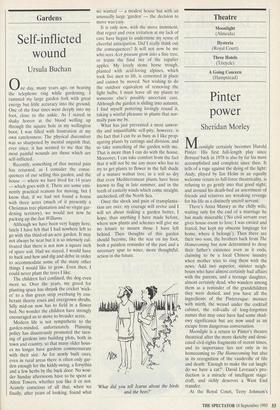Gardens
Self-inflicted wound
Ursula Buchan
0 ne day, many years ago, on hearing the telephone ring while gardening, I rammed my large garden fork with great energy but little accuracy into the ground. One of the four tines went deeply into my foot, close to the ankle. As I stared in shaky horror at the blood welling up through the square hole in my wellington boot, I was filled with frustration at my own carelessness. The physical discomfort was so sharpened by mental anguish that, ever since, it has seemed to me that the most painful wounds are those which are self-inflicted.
Recently, something of that mental pain has returned, as I consider the conse- quences of our selling this garden, and the house — where we have lived for 14 years — which goes with it. There are some emi- nently practical reasons for moving, but I know that, if we had not found a house with three acres (much of it presently a Christmas tree plantation and so virgin gar- dening territory), we would not now be packing up the Just Williams.
Although we have been very happy here, lately I have felt that I had nowhere left to go with this third-of-an-acre garden. It may not always be neat but it is so intensely cul- tivated that there is not now a square inch of spare soil. Had we stayed, I would have to hack and hew and dig and delve in order to accommodate some of the many other things I would like to grow. Even then, I could never plant the trees I like.
The children feel confined, the dog even more so. Over the years, my greed for planting space has shrunk the cricket 'wick- et' to a thin green strip overhung by exu- berant thorny roses and overgrown shrubs. Silly mid-on now has to field in a flower bed. No wonder the children have strongly encouraged us to move to broader acres. Modern life is not sympathetic to the garden-minded, unfortunately. Planning policy has disastrously promoted the turn- ing of gardens into building plots, both in town and country, so that many older hous- es no longer have gardens commensurate with their size. As for newly built ones, even in rural areas there is often only gar- den enough for the kiddy-swing, a forsythia and a few herbs by the back door. No won- der Sunday afternoons have to be spent at Alton Towers, whether you like it or not. Acutely conscious of all that, when we finally, after years of looking, found what we wanted — a modest house but with an unusually large 'garden' — the decision to move was easy.
It is only now, with the move imminent, that regret and even irritation at my lack of care have begun to undermine my sense of cheerful anticipation. Did I really think out the consequences? It will not now be me who sees Acer griseum grow into a fine tree, or trains the final tier of the espalier apples. My lovely stone horse trough, planted with acid-loving alpines, which took five men to lift, is cemented in place and cannot be moved. Not wishing to do the outdoor equivalent of removing the light bulbs, I must leave all my plants to someone else's possibly uncertain care. Although the garden is sliding into autumn, I find myself pottering lovingly round it, taking a wistful pleasure in plants that nor- mally pass me by.
What has just prevented a most unwor- thy and unjustifiable self-pity, however, is the fact that I can be as busy as I like prop- agating plants by cuttings and division, and so take something of the garden with me. That is more than I can do with the house. Moreover, I can take comfort from the fact that it will not be me any more who has to try to get plants to flower in the full shade of a mature walnut tree, in a soil so dry that even Mediterranean plants have been known to flag in late summer, and in the teeth of easterly winds which come straight, unchecked, off the North Sea.
Once the shock and pain of transplanta- tion are over, my courage will revive and I will set about making a garden better, I hope, than anything I have made before, where new plants and schemes will give me no leisure to mourn those I have left behind. Then thoughts of this garden should become, like the scar on my foot, both a painless reminder of the past and a necessary spur to wiser, more thoughtful, action in the future.
`What did you tell Icarus about the birds and the bees?'


































































 Previous page
Previous page